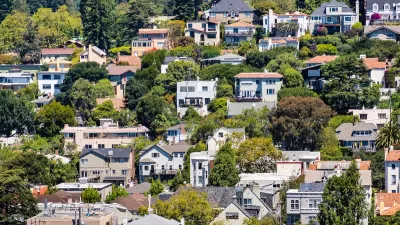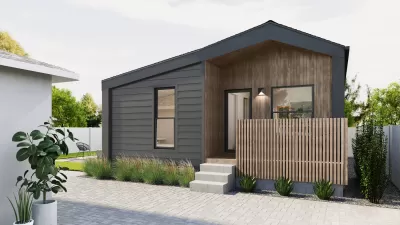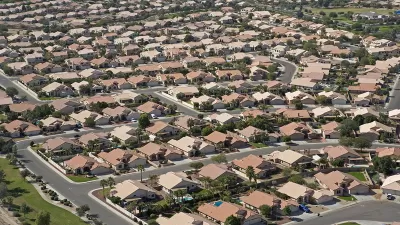Incremental changes to density on single-family parcels could boost the nation’s housing stock without dramatic impacts at the neighborhood level.

A new analysis shows that even small-scale upzoning in metropolitan areas could provide a substantial amount of new housing. '[Issi Romem] found that even modest densification efforts could have significant impact nationwide—across the 17 metro areas analyzed, allowing 10 percent of single-family lots to house two units instead of one could yield almost 3.3 million additional housing units—and especially in California," writes Patrick Sisson.
In addition, Romem argues that such upzoning, which would largely involve accessory dwelling units and smaller multi-family residential buildings, would not drastically change the character of neighborhoods. The densification would be less concentrated than other housing strategies, but it would provide environmental benefits and also keep home prices from increasing substantially.
As a result, it would be a more politically feasible alternative in a state like California. "It’s the 'missing middle' proposal, a reference to types of smaller multi-unit housing structures that traditionally provided more affordable housing, but tend to not be built today due to land costs and other economic pressures," adds Sisson.
FULL STORY: Why California, and the nation, shouldn’t be afraid of density and upzoning

Study: Maui’s Plan to Convert Vacation Rentals to Long-Term Housing Could Cause Nearly $1 Billion Economic Loss
The plan would reduce visitor accommodation by 25,% resulting in 1,900 jobs lost.

North Texas Transit Leaders Tout Benefits of TOD for Growing Region
At a summit focused on transit-oriented development, policymakers discussed how North Texas’ expanded light rail system can serve as a tool for economic growth.

Using Old Oil and Gas Wells for Green Energy Storage
Penn State researchers have found that repurposing abandoned oil and gas wells for geothermal-assisted compressed-air energy storage can boost efficiency, reduce environmental risks, and support clean energy and job transitions.

Private Donations Propel Early Restoration of Palisades Playground
Los Angeles has secured over $1.3 million in private funding to restore the Pacific Palisades playground months ahead of schedule, creating a modern, accessible space that supports community healing after recent wildfires.

From Blight to Benefit: Early Results From California’s Equitable Cleanup Program
The Equitable Community Revitalization Grant (ECRG) program is reshaping brownfield redevelopment by prioritizing projects in low-income and environmental justice communities, emphasizing equity, transparency, and community benefits.

Planting Relief: Tackling Las Vegas Heat One Tree at a Time
Nevada Plants, a Las Vegas-based nonprofit, is combating the city’s extreme urban heat by giving away trees to residents in underserved neighborhoods, promoting shade, sustainability, and community health.
Urban Design for Planners 1: Software Tools
This six-course series explores essential urban design concepts using open source software and equips planners with the tools they need to participate fully in the urban design process.
Planning for Universal Design
Learn the tools for implementing Universal Design in planning regulations.
Ascent Environmental
Borough of Carlisle
Institute for Housing and Urban Development Studies (IHS)
City of Grandview
Harvard GSD Executive Education
Toledo-Lucas County Plan Commissions
Salt Lake City
NYU Wagner Graduate School of Public Service





























